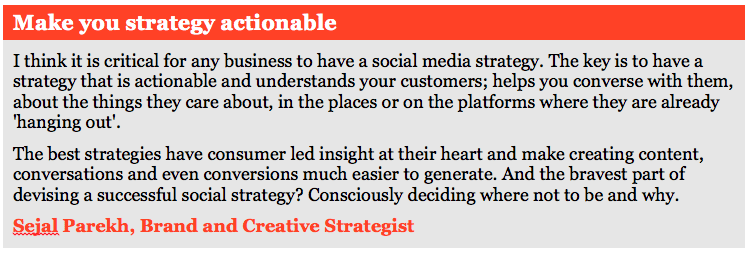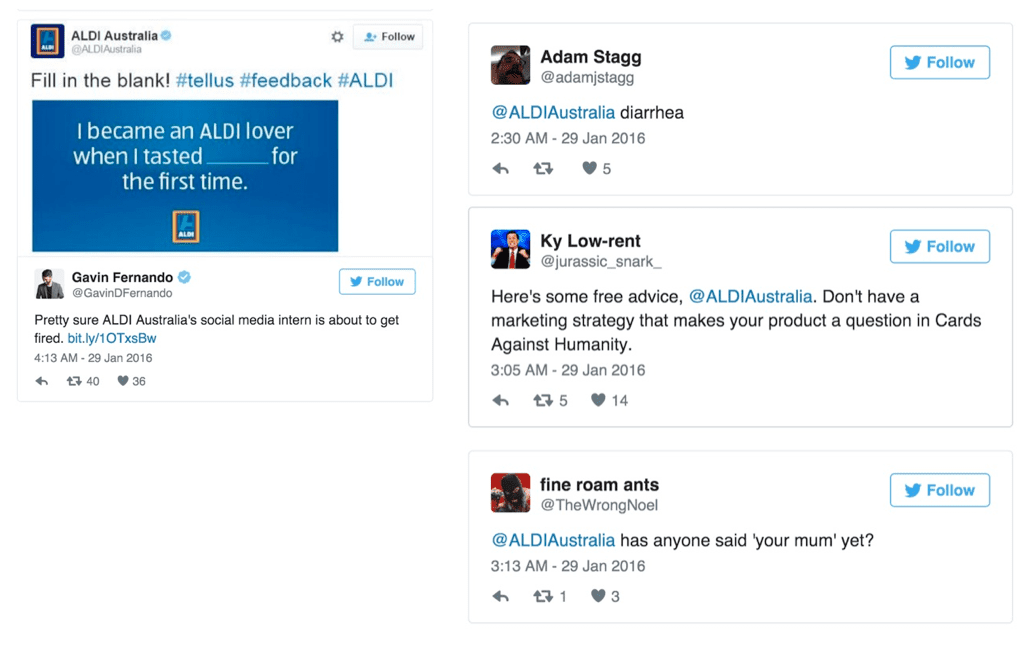Social media strategy and planning essentials: 6 reasons why you need a social media strategy


Social media strategy and planning essentials
First let’s answer the question, “What is a social media strategy?”
A social media strategy defines how your organisation will use social media to achieve its communications aims and the supporting platform and tools it will use to achieve this. At a basic level it’s a simple statement of intent, outlining the goals and measurable objectives for using social media, and the target outcomes you want to achieve. It does this in the context of the overall business and comms plan, so that social media isn’t in a silo but working in parallel with other channels. It isn’t a detailed plan of action – you’ll also need a plan but without a clear strategy, how do you prioritise the activities for a plan? Think strategy first, plan second.
Even if you’re not actively involved in social media, other businesses are, including your competitors and most likely a significant proportion of your customers. Failing to understand that this is where many people hold conversations means you’re not part of the discussion, and you can’t influence what happens.
If you don’t know what’s being said, how can you effectively manage your brand reputation online? And how can you ensure that your key messages are being heard by the people you most want to talk to?
Here are six key reasons why your organisation needs a coherent social media strategy and plan.
1. The social web still is growing fast
The latest research on social media usage shows that there are two key factors driving the social web according to a Global Web Index study:
- 1. Mobile – people accessing the internet via mobile increased by 60.3% to 818.4m between 2012 and 2014
- 2. Older user adoption – on Twitter the 55-64 year age bracket is the fastest growing demographic with 79% growth rate since 2012; the fastest growing demographic on Facebook and Google+ is the 45-54 year age bracket.
Improved mobile connectivity globally has increased ‘on the go’ social activity, from catching up on friends’ updates to sharing content and watching video. Social media usage research in the US from Ruder Finn measures the reasons why people go online and socialising is one of the key drivers:
As people spend more time on social media, consuming more content than ever before, you might think that the space is saturated so getting involved isn’t justifiable.
Wrong!
Creating a targeted social media strategy will help you focus on using relevant platforms to connect with existing and new customers and avoid simply adding to the noise.
2. Purchasing decisions are influenced by social media
If the first era of social was audience building and engagement, the current era is focused on commerce and personalisation. All major platforms have heavily invested in their advertising solutions to lure marketers with the promise of improved APIs and smart targeting, including the ability to upload email lists to run personalised remarketing campaigns.
For example, through the Facebook API marketers can:
- Manage audience data for custom audience targeting
- Create campaigns and ads
- Build custom dashboards and run analytics
- Manage campaign assets: pages, accounts etc.
- Research from Crowdtap revealed that 64% of 3,000 people surveyed use social to find inspiration for shopping (up 51% vs. prior year). This is driven by retailers targeting consumers with personalised offers and deals on social networks.
Nearly half (46%) of social media users are already using social platforms while thinking about making a purchase. 40% of users are actively deciding what to buy based on what they have seen on social media platforms, including reviews and recommendations, and this is only set to grow.
Peer recommendation has the most influence on holiday gift purchases, more than blogger or celebrity endorsement. Given the importance of peak trading to the overall sales target, you need to plan how to encourage people to share and talk about your products.
There are subtle differences between the role each social network plays in the purchase cycle. For example, Pinterest is a great place for people to find inspiration and works well as a visual product storyboard. Facebook is well suited to people looking to share content and find promotions.
Without a clear strategy, how do you know what role these networks can and should play in your customers’ buying cycles? How do you know you’re not losing out on potential sales, or trying to sell to people who aren’t looking to be sold to?
3. Lack of strategy hands the advantage to competitors
It’s uncommon to find an organisation without a social presence and increasingly companies are developing clear social strategies aligned with business goals.
A marketer with a strategy has a framework through which to plan, prioritise, execute, measure and optimise. This typically will lead to better results because the activity has direction, even if the direction needs to evolve and change as the marketer learns from real data.
If you invest in a social presence without a clear strategy, you won’t know whether or not your campaigns are successful. For example, if you simply post content to appear active, how do you know that content is contributing to the business positively? What if it’s actually putting people off your brand?
I once sat in a meeting where a marketing exec reported on social performance and was delighted that a tweet got more than 100 RTs over the weekend. The team decided this was success. However, on closer inspection, the tweet included a poorly chosen hashtag and the hashtag’s and this generated the RT activity. Unfortunately, the core hashtag users weren’t relevant and certainly not a target audience.
Why did this happen?
There was no plan or guidelines in place for the marketing team to know what to post, when, how, to whom and why. For example, no research done on hashtags to define which conversations the company should and could be a meaningful part of.
With no structured approach to communication and measurement, you risk wasting resource on undirected activity. Meanwhile savvier competitors will be working smarter at engaging customers based around clear goals, objectives and targets so performance is being measured, rather than results reported.
4. Your customers are active on social media
Mobile, social and the underlying technology have combined to provide an environment in which people can access, use and share information on their terms. Friends of mine rarely read blogs or emails; they use Facebook as their content stream. The disintermediation of content means that you have to understand the role social plays in customer communication.
Even though it’s only a subset of your total audience, it’s likely that some of your customers will want to get information from you via social network. A good example is the rise of Twitter for customer service, with brands like BT embracing it as an effective customer enquiry and problem resolution channel. That doesn’t mean ignore traditional forms of customer service, it means updating your customer service framework to factor in social interactions.
This is why you need a strategy. Deciding how to connect with customer is not a tactical decision, it requires strategic thinking. Social needs to align with the other communication channels so its role is defined and understood, and there are processes and tools in place to cope with demand. If you let a social marketing team simply get on with it, without the strategic vision above it, you risk inefficiency and inaccuracy. That said, Jay Baer does advise to not ‘bite off more you can chew’ in your social strategy – he says keep the scope narrow in this article on social media strategy in 7 Steps.
5. There are key influencers in every social network
Don’t underestimate the power of peer and/or influencer recommendation.
For years retailers have known that customer ratings and reviews can increase conversion rates through the power of peer influence; feedback from another customer is typically seen as trustworthy. Expert endorsement also increases brand credibility. For example, in highly specialised tech markets like audio visual, the experts’ opinions are highly sought after and can make or break products.
Social media channels have influencers, from the obvious celebrities to self-made social stars like video bloggers. High street retailers often employ trending influencers to amplify their marketing messages. For example, Topshop worked with five rising Instagram stars to help shoot its London Fashion Week show.
If you’re not part of their world, you’re not relevant. You risk losing mindshare to more socially aware competitors who are willing to be bold and innovative in their marketing campaigns. And if none of the key social influencers for your target audience are interested in your company and its products, it’s much harder to get your message across to the end customer.
6. Reputations can be enhanced or destroyed on social networks
There are good things that we can attribute to social media, primarily in terms of providing a voice to people and groups who previously struggled to be heard and of making information transparent and portable. However, it also amplifies the voice of discontent and vitriol is not uncommon. Jumping on angry bandwagons is also something that social seems to fuel periodically.
The example below is from a genuine marketing campaign that the Aldi social team launched but it attracted a lot of negative tweets and trolling.

What will you do if the world decides you’re enemy #1 and attacks you on Twitter?
How will you respond to an avalanche of negative tweets?
There are high profile examples of companies facing a social media backlash and struggling to respond effectively. Even those with a social media strategy that includes crisis response find it hard. So how much damage could be done to your organisation if you don’t even have a strategy? It’s a risk you shouldn’t take.
Your thoughts, comments and personal experience
This is step 1 in the Smart Insights 12 step series on social media strategy and planning. It’s by no means an exhaustive list of reasons why you should have a social media strategy; it’s more a steer in the right direction and food for thought.
Please join in the discussion with comments and your own experience. Keep an eye out for next month’s article, “How do we create a social media strategy and plan?”.
Thanks
James
 Thanks to James Gurd for sharing their advice and opinions in this post. James Gurd is an experienced ecommerce and digital marketing consultant with more than 14 years’ B2C and B2B digital strategy experience. He is the Owner and lead consultant at Digital Juggler. You can follow him on Twitter or connect on LinkedIn.
Thanks to James Gurd for sharing their advice and opinions in this post. James Gurd is an experienced ecommerce and digital marketing consultant with more than 14 years’ B2C and B2B digital strategy experience. He is the Owner and lead consultant at Digital Juggler. You can follow him on Twitter or connect on LinkedIn.
From our sponsors: Social media strategy and planning essentials: 6 reasons why you need a social media strategy



